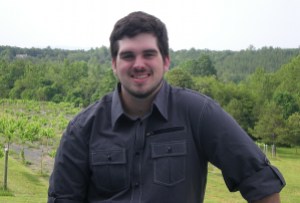As part of his Master of Public Administration coursework at Western Carolina University, Kasey Baker enrolled in Professor Christopher Cooper’s “Policy Analysis” course – one of 33 courses to participate in the Wikipedia Public Policy Initiative in the spring term. Kasey was surprised to hear that his work for the course included writing a Wikipedia article on a course-related topic.
One of Kasey’s first tasks was to select a mentor from the available Online Ambassadors.
“Let me sum up my online mentor, Alex Dunkel (AKA VisionHolder), in two words: ‘Amazing Rockstar,'” Kasey says of his choice. “With 26 GA articles and 16 Featured articles under his belt, there was almost nothing he did not know about Wikipedia. From the onset, we realized we both were huge nerds that liked HTML formatting and well-cited materials. After spending what was close to 30+ hours on Skype, we not only produced a fantastic article, but we became friends as well. Without his help, my article would have not been anywhere near the quality it is currently nor would I have enjoyed the experience as much as I did.”

Kasey’s focus in grad school is on environmental policy, and he’d recently become interested the United States’ nuclear policy. After extensive research on Wikipedia, he discovered that there was no unifying article that summed up U.S. policy; instead, there were several smaller articles that often carried neutrality warnings at the top of the page. Alex, in his role as online mentor, warned Kasey that it would be a difficult undertaking – but Kasey wanted to ensure that this important facet of U.S. policy had a Wikipedia article, so he accepted the challenge.
“This assignment was probably the most intense and heavily researched assignment I have ever done,” he says. “When I was looking at my graduate writing on the nuclear policy history, I realized that many sources were biased or did not meet the quality standard that Wikipedia expected. This was not saying they were unreliable sources, I simply felt that they might not pass the scrutiny of all those who would be looking at them. Moreover, properly citing the materials on my Wikipedia page was far more extensive than that of any other academic writings I’ve ever produced.”
As Kasey began to work on his article, the Fukishima nuclear disaster struck, bringing increased attention to Kasey’s fledgling article. His submission to the Did You Know process brought more attention to his article – including more than 3,000 views on the day his article appeared on Wikipeda’s main page. And Kasey started understanding more and more why so many of the nuclear articles had that neutrality tag applied.
“At every step of the process, I’ve had people fight my article in some way,” he laments. “Fortunately, it has usually been over the title and other minor details that people blew out of proportion. Because I kept my information strictly about policy and made sure it was 100% accurate from reputable sources, no one could accuse the information in my article as being inaccurate or biased.”
He feels some more recent additions to the article’s current events section have the potential to detract from the article’s quality, if other authors do not refine the changes and improve the updates, but it hasn’t caused Kasey to stop working on Wikipedia. Part of that is thanks to his mentor, Alex, who helped him every step of the way. And Kasey realizes that the next topic he tackles on Wikipedia will be one that is less controversial – and he hopes to have another class where the course assignment is to write Wikipedia articles.
“I wholeheartedly prefer writing a Wikipedia article to a traditional paper,” Kasey says. “Most papers, even in graduate school, are almost never shared with the academic community, much less with the general public. With this project, I feel that I am not only able to share my research, but can have a real conversation with others about nuclear policy. Not to mention by creating a Wikipedia article, it expands the information available to anyone curious about the topic. I honestly wish that other classes would involve the submission of Wikipedia articles like this more often.”
—
LiAnna Davis
Communications Associate, Public Policy Initiative

Can you help us translate this article?
In order for this article to reach as many people as possible we would like your help. Can you translate this article to get the message out?
Start translation